SWEDISH SOUTH ASIAN STUDIES NETWORK
SASNET/Lund University/KTH/Swallows seminar on Arsenic in Drinking Water
A well-attended seminar on Arsenic in Drinking Water was held at Lund University on Wednesday 5 May 2010.
The successful seminar was organized by SASNET in collaboration with:
– Lund University Centre for Sustainability Studies (LUCSUS)
– The Division of Water Resources Engineering, Lund University
– KTH-International Groundwater Arsenic Research Group at the Dept. of Land and Water Resources Engineering,
Royal Institute of Technology (KTH), Stockholm
– The Swallows India-Bangladesh section.
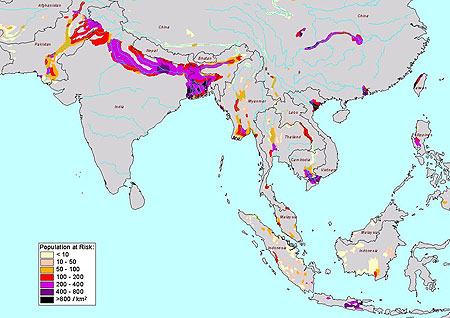 Arsenic in groundwater constitutes a major human health issue in many countries globally. It is particularly acute in the Bengal Delta Plains in Bangladesh and India but has also prevalent in many other parts of the world, including Argentina, Chile, Mongolia, and the United States. The problem of arsenic poisoning in the Bengali countryside has received considerable media attention, since it affects a maximum umber of people, 30 million in Bangladesh and 5 million in West Bengal.
Arsenic in groundwater constitutes a major human health issue in many countries globally. It is particularly acute in the Bengal Delta Plains in Bangladesh and India but has also prevalent in many other parts of the world, including Argentina, Chile, Mongolia, and the United States. The problem of arsenic poisoning in the Bengali countryside has received considerable media attention, since it affects a maximum umber of people, 30 million in Bangladesh and 5 million in West Bengal.
Although the source of arsenic is natural, people’s exposure to arsenic in drinking water is the result of extensive groundwater development that began in the 1970s with the support of international development agencies.
Arsenic poisoning caused by the widespread boring of wells for drinking water has become a major problem, maybe on a scale equivalent to the problem of unhygienic surface water causing diarrhoea diseases (and which was the original reason behind the massive efforts to bore groundwater wells from the 1970s).
The seminar probed the issue of arsenic poisoning in a broad social context and an interdisciplinary perspective, with a focus on how to provide safe drinking water in the future, and what is presently being done by researchers, donors and practitioners working with these issues. The presentations gave insights from many different perspectives.
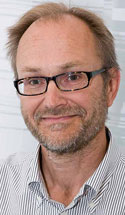 |
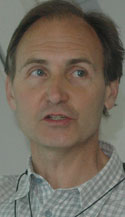 |
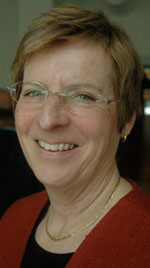 |
| Lennart Olsson | Torleif Dahlin | Marie Vahter |
Prof. Lennart Olsson from LUCSUS was the moderator for the day, and introduced the semiar by referring to the first time he came across the problems with arsenic in ground water, in an article in Science in 1988.
Prof. Torleif Dahlin, Division of Engineering Geology, Lund University, gave the first presentation. He gave a broad overview about groundwater in general, the presentation entitled ”Groundwater – the hidden resource. A world survey”.
See his presentation.
Prof. Prosun Bhattacharya, who leads the International Groundwater Arsenic Research Group (GARG) at KTH, came next, putting specific focus on the arsenic problems in his presentation entitled ”Global Overview of Natural Arsenic in Groundwater – Perspectives and Challenges”. See his presentation.
Prof. Marie Vahter, Division of Metals & Health, Institute of Environmental Medicine (IMM), Karolinska Institutet, Stockholm, is a world leading expert on the health hazards connected not only to arsenic but also to other metals prevalent in drinking water. In her presentation, entitled ”Health effects of arsenic with special focus on early-life exposure”, she pointed out the extremely damaging effects that Arsenic poisoning causes to human lives. The skin defects often shown are not the worst, but instead its strong cancerogenous effects and how it negatively affects the immunary defence. There is a direct correlation between the mortality rate and high levels of Arsenic in food and water. See her presentation.
Dr. Abul Mandal, School of Life Sciences, Skövde University, then talked about his ongoing research project, focusing on ”Studies of genes involved in uptake and/or metabolism of arsenics in plants: A practical approach for protection of human from arsenic contamination”. By developing new varieties of rice it may be possible to reduce the amount of arsenic taken up by the plants from the irrigation water commonly used for rice cultivationin Bangladesh. See his presentation.
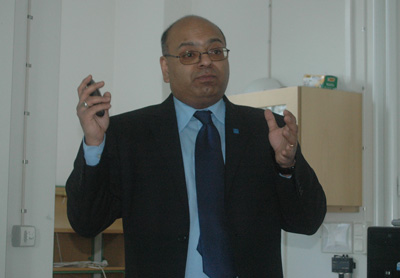 Prosun Bhattacharya (photo to the right) came back and gave a second presentation, entitled ”Strategies for Sustainable Arsenic Mitigation in Bangladesh”, focusing on the experiences from the major Sida-funded Sustainable Arsenic Mitigation (SASMIT) project that his research grouphas been engaged in since 2007. The project aims to develop community driven initiatives to target arsenic safe groundwater as sustainable mitigation strategy (more information about the project).
Prosun Bhattacharya (photo to the right) came back and gave a second presentation, entitled ”Strategies for Sustainable Arsenic Mitigation in Bangladesh”, focusing on the experiences from the major Sida-funded Sustainable Arsenic Mitigation (SASMIT) project that his research grouphas been engaged in since 2007. The project aims to develop community driven initiatives to target arsenic safe groundwater as sustainable mitigation strategy (more information about the project).
See Prosun Bhattacharya’s second presentation.
Prosun was followed by Mr. Mattias von Brömssen, previously connected as a PhD candidate to the same research group at KTH, but now working for Ramböll Sweden in Stockholm, at its Department for Water Resources Management. He talked about ”Challenges for providing safe drinking water in regions with high As-groundwater in Bangladesh”.
See his presentation.
Finally, Ms. Eva Hägerstrand, Coordinator for the Swallows India-Bangladesh Section, based in Lund, talked about ”The Drinking water situation in rural Bangladesh today”. Her talk was based upon interviews that Mr. Raihan Ali, working for the Thanapara Swallows Development Society in Rajshahi district, Bangladesh, has made with local villagers. From their responses it is clear that there is now a conciousness about the problem, and local solutions are tried to improve the situation.
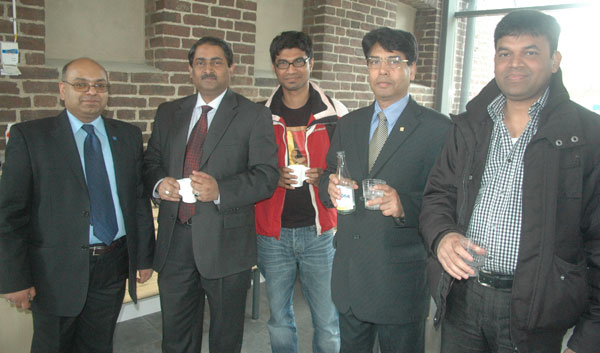 |
| Partcipants to the Arsenic semiar at Lund University. From left to right: Prof. Prosun Bhattacharya, Dept. of Land and Water Resources Engineering, KTH; Mr. Imtiaz Ahmed, Ambassador of Bangladesh to Sweden; Mr. Masud Kamal, Masters student in Development Studies, Lund University; Dr. Abul Mandal, School of Life Sciences, Skövde University; PhD candidate Abdel Baten Miaji, Division of Islamology, Lund University. |
After the presentations, a panel debate was organised with all the speakers, with much input from the audience, not the least from H.E. Mr. Imtiaz Ahmed, Ambassador of Bangladesh to Sweden, who was the guest of honour during the day. Lennart Olsson from LUCSUS led the debate and tried to initiate a discussion on accountability, whether anybody could be blamed for the current situation.
The massive well boring project in Bangladesh funded by Sida, the Swedish Development Cooperation Agency, in the past carried out without proper water analysis in beforehand, was for example highlighted in media some years ago. The panel was however mild in its judgement, saying that it is not possible to demand responsibility from a funding agency for a failed project several years afterwards. Besides the main responsibility for monitoring the water quality must be put on the owners.
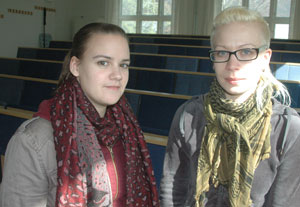 |
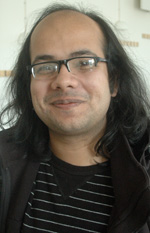 |
| Students coming from Stockholm University to participate in the Lund seminar: Maria Lagerström and Elin Lavonen from the Dept. of of Geology and Geochemistry & Dept. of Materials and Environmental Chemistry (MMK); and Muhammad Arifin Sandhi from the Dept. of Botany. | |
Marie Vahter also warned against only focusing on Arsenic when it comes to testing drinking water. Other elements may be as harmful for the human body as Arsenic, and therefore a comprehensive testing is needed.
Most of the discussion focused on existing alternative methods to improve the situation in Bangladesh. One suggestion was to build big wells that are free of Arsenic and build a distribution system from these, a solution that has been used for example in Chile. Other effective means like installing filters, and harvesting of rainwater, were also pointed out. There are however economic, and social barriers that makes it difficult to introduce costly apparatus, and even a cultural barrier in changing people’s behaviour regarding the use of drinking water.
Funding for the seminar was kindly provided by Swedish Water House (SWH) in Stockholm, and Sydvatten AB in Malmö.
It was held at Geocentrum, Sölvegatan 10 in Lund.
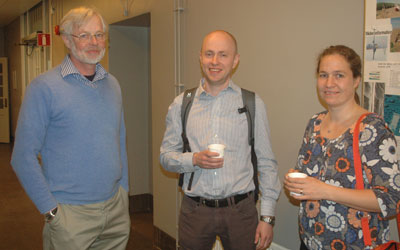 |
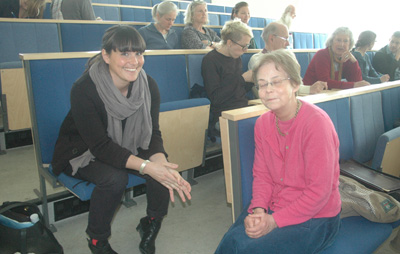 |
| Seminar participants: Göran Larsson, Sida; Mattias von Brömssen, Ramboll Sweden; and Christina Jenkins, Ramboll Sweden. | Seminar participants: Hanna Wolf, Swedish Water House; and Eva Hägerstrand, Swallows India-Bangladesh section. |
See the full seminar programme |
Poster for the Arsenic seminar |
SASNET - Swedish South Asian Studies Network/Lund
University
Address: Scheelevägen 15 D, SE-223 70 Lund, Sweden
Phone: +46 46 222 73 40
Webmaster: Lars Eklund
Last updated
2010-05-19
